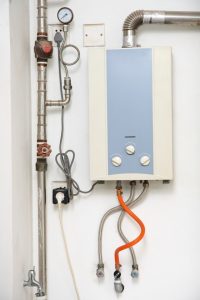It’s time to replace or upgrade your water heater. It’s gotten too old to get the job done properly, or perhaps it’s got some corrosion, and it’s only a matter of time before it springs a terrible leak. Now you need to do some research about your water heater replacement options.
What kind of new water heater will be right for you? Surely, you’ve heard great things about tankless water heaters. But are they always the best choice? We’ll give you some facts so you can decide for yourself. If you’d like to have a conversation with an expert about tank water heaters vs tankless water heaters in Wayne, NJ, we’d love to answer all your questions.
How Water Heaters Work
While some water heaters use natural gas combustion for energy, and others are powered by electricity, many of the components of tank water heaters are the same. There’s a hydrostat, which is like a thermostat but for measuring the temperature of water instead of air. There’s a pressure release valve, to control the pressure within the tank. And there’s an anode rod inside the tank.
The anode rod does the critical job of delaying the inevitable onset of corrosion. It attracts the ions that might otherwise cause oxidation on the tank itself. To keep your tank water heater functional for as long as possible, you’ll need that anode rod replaced occasionally.
In a tank water heater, the heated water is held until it is needed. Then, as it gets used up, cold water enters the tank to be heated. In a tankless system, only a tiny amount of water is heated at a time—just what is actually being called for at the moment. This means there’s no need to keep a quantity of water at a high temperature at all times.
Benefits of Tankless Systems
Without a constant need to keep large amounts of water hot, your tankless water heater can use less energy than a tank water heater would. Plus, there will never be a time when all the hot water is “used up” and you must wait for a tank full of water to heat before you can take a shower!
And without a tank to hold water and be forever trying to hold the threat of corrosion at bay, the tankless system will last longer. While a tank water heater might last eight or ten years, perhaps as many as twelve if it is meticulously maintained, a tankless system might last twenty.
Benefits of Tank Water Heaters
There are two major advantages that tank water heaters have. The first is that they can produce large amounts of hot water all at once, while a tankless system maxes out at 2-5 gallons per minute. This makes tank systems the better choice for large households with several people or appliances using hot water at the same time.
The second advantage is the initial cost. A tank water heater is significantly less expensive than a tankless system. Over time, because a tankless system uses less energy and lasts several years longer, you would slowly recoup that investment. But in the short term, a tank water heater is definitely the more affordable option.
Contact MarGo Plumbing Heating Cooling Inc. today with hot water concerns or any questions about water heaters!

